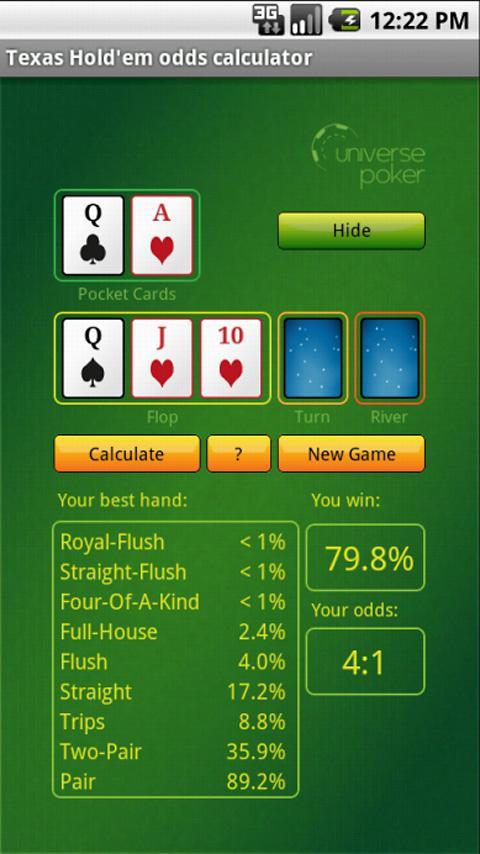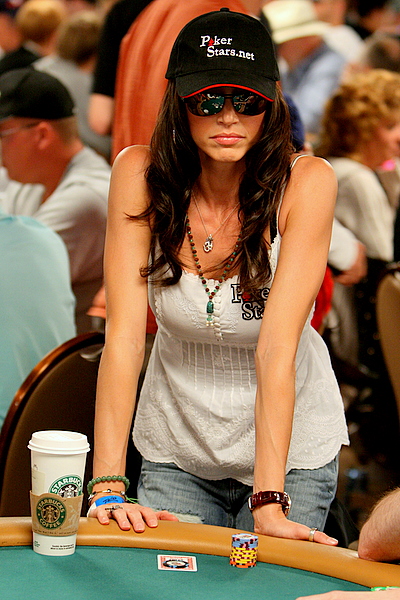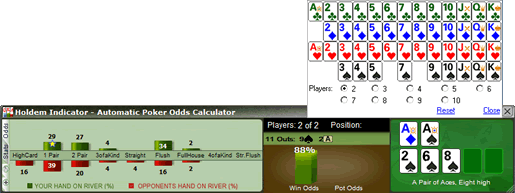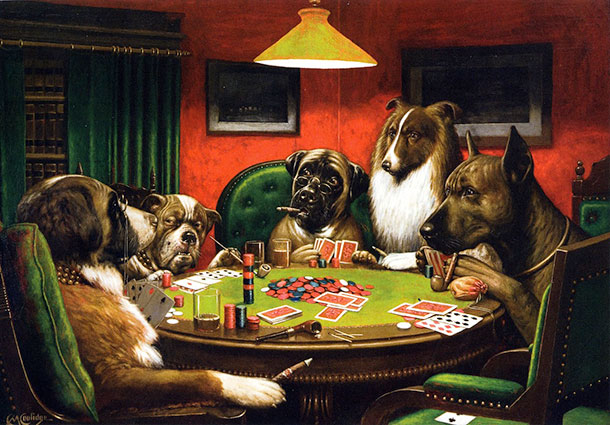Texas Holdem Flop Odds Calculator


Are you good at math? Hmm, thought so. Neither am I.
A poker odds calculator is a piece of poker software that lets you run any scenario that you might see at a poker table. You can fill in your own hand and calculate the chances of you winning. Therefore, I will explain a simple rule, which will help you a lot with Texas Holdem odds. There is quite an easy way to get the answer very fast and we can call it “the rule of 2 and 4”. If you are on the flop just multiply your outs by 4 and you will get an approximate percentage how likely you are to improve your hand till the river.
For many poker players, doing math calculations is the last thing on their mind when they sit down at the felt. They're there to play and have fun!
Still, poker is more fun when you win, and it helps to know the winning potential of starting cards. Remember, there's a reason for the saying, 'Never draw to an inside straight.'
Because figuring percentages in your head would slow down the game, should you bring a pocket calculator to the table? No way!
Fortunately, some situations repeat quite often in Texas hold 'em, and it's easy to memorize the math involved. Once that's done, you can concentrate on everything else going on at the table.

Today, let's re-examine the math of some common hold 'em situations originally listed in a 2006 LuckyDog Poker column:
— Being dealt any pocket pair in the hole — 6 percent (one in 17) chance. Getting A-A, K-K, Q-Q, or J-J as your starting hole cards — 1.8 percent (one in 56).
— Improving any pocket pair to trips on the flop — 12 percent (one in eight). If you don't make trips on the flop, there's a 9 percent (one in 11) chance of doing so on the turn and river cards.
— A no-pair starting hand improving to a pair on the flop (either card) — 32 percent (one in three).
— Completing an open-ended straight after the flop — 34 percent (one in three). For instance, you hold 10-9, the flop is J-8-2, and the last two cards are 4-7.
— Being dealt suited hole cards (two spades of any rank, for example) — 24 percent (one in four). Being dealt suited connectors such as Q-J of hearts — 4 percent (one in 25).
— Hitting two cards of your suit on the flop — 11 percent (one in nine). Completing a flush after two cards of your suit come on the flop — 39 percent (one in 2.6).
— Being dealt A-K to start — 1.2 percent (one in 83). With A-K in the pocket, hitting an ace or king by the river — 50 percent (one in two).
These numbers identify your chances of receiving certain starting cards and hitting specific hands, but that's not the whole story. Knowing these percentages allows you to calculate 'pot odds,' which gives you a mathematical reason for staying or folding.
For example, let's say after the flop you have an open-ended straight draw with a 34 percent (one in three) chance of making the straight by the end of the hand — 17 percent (one in six) chance of hitting on the turn card, plus 17 percent again to hit on the river.
In this case, as long as there is five times as much in the pot as the amount you must put in on a single bet, you're getting sufficient pot odds to stay in. In low-stakes limit games, calling usually is automatic. In no-limit, however, an opponent's big bet often negates your odds and you should fold.
Now, about those inside straight draws: Is it true you should 'never draw to an inside straight?' Actually, no!
Sure, most of the time you should fold because the chances of hitting your straight on the next card are slim (11 to one against). But on rare occasions, you'll have the proper pot odds to make the draw. Do the math!
E-mail your poker questions and comments to [email protected] for use in future columns. To find out more about Russ Scott and read previous LuckyDog Poker columns, visit creators.com or luckydogpoker.com.
Our common flop odds chart shows the exact odds of flopping specific hand or draw types with various hole card groupings in Texas Holdem.
Remember that every mistake you make preflop will only be magnified on later streets. The chart below clearly shows that playing weak hole cards (for example three gapped connectors) will rarely give you the best hand on the flop.
This is why you should play only a narrow range of the best hole cards and fold everything else. It is especially important when you are a beginner. The more weak hands you play, the more money you will lose in the long term.
Common flop odds chart
| Hole Cards | Flopping | Odds |
| Unpaired Hole Cards | exactly one pair by pairing a hole card | 26.939% |
| exactly two pair by pairing a hole card and pairing on the board | 2.02% | |
| exactly two pair by pairing each of your hole cards | 2.02% | |
| exactly trips by flopping two cards to a hole card | 1.347% | |
| exactly a full house, trips of one hole card and pairing the other | 0.092% | |
| exactly four of a kind, three cards to one of your hole cards | 0.01% | |
| Paired Hole Cards | exactly two pair by pairing the board | 16.163% |
| exactly trips by flopping a set for your pocket pair | 10.775% | |
| exactly a full house, a set to your hole pair and pairing the board | 0.735% | |
| exactly a full house, by the board tripping up | 0.245% | |
| exactly four of a kind, two cards to your hole pair | 0.245% | |
| Two Unsuited Cards | a flush draw | 2.245% |
| Two Suited Cards | a flush (including straight flush) | 0.842% |
| a flush draw | 10.944% | |
| Connectors (54 to JT) | a straight (including straight flush) | 1.306% |
| an 8 out straight draw (excluding gutshots) | 10.449% | |
| One Gapped Connectors (53 to QT) | a straight (including straight flush) | 0.98% |
| an 8 out straight draw (excluding gutshots) | 8.08% | |
| Two Gapped Connectors (52 to KT) | a straight (including straight flush) | 0.653% |
| an 8 out straight draw (excluding gutshots) | 5.224% | |
| Three Gapped Connectors (A5 to AT) | a straight (including straight flush) | 0.327% |
| an 8 out straight draw (excluding gutshots) | 2.612% |
Texas Holdem Flop Odds Calculator Game

More articles on poker probability:
Poker odds calculator
Poker outs and odds
Pot odds and expected value
Sklansky bucks
Implied odds
Reverse implied odds
Poker hand probability chart
Common flop odds chart
Pocket pairs - flopping overcards odds

Texas Holdem Flop Odds Calculator Online
Go back to the Online Poker Strategy.